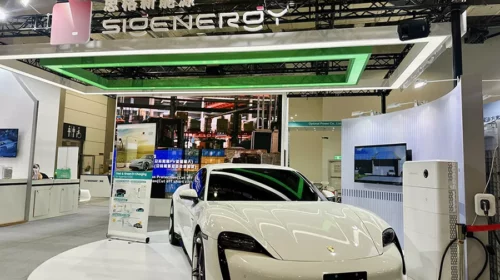JinkoSolar Pushes Into Power Storage with New European Tie-Up

Germany’s Memodo will use Jinko-supplied storage systems in new solar projects across Germany, Austria, and Switzerland
Key Takeaways:
- A German wholesaler has agreed to distribute JinkoSolar’s PV panels and batteries in Germany, Austria, and Switzerland through the end of next year
- The deal signals JinkoSolar’s push into battery storage to complement its solar panel business and maintain its spot as the world’s biggest solar panel maker
By Andrew Curran
China’s top solar panel manufacturer is pouring massive time, money and effort into solving the single biggest problem stymying the uptake of renewable energy – the lack of reliable energy storage options. Put simply, solar farm operators are often hamstrung by having limited or no options for storing their extra energy created during daylight hours for use when the sun literally doesn’t shine.
In its latest major advance to tackle that problem, JinkoSolar Holding Co. Ltd. (JKS.US; 688223.SH) said last Friday it has signed its first European energy storage agreement with Germany’s Memodo, which will see the Chinese company’s storage systems included in new solar projects built using its solar panels across Germany, Austria, and Switzerland through the end of 2023.
Investors welcomed the news, with JinkoSolar’s New York-listed shares rallying 8.4% the day of the announcement. Such storage products not only make the company’s solar panels more attractive for potential buyers, but could also become an important new income source going forward. The reception was cooler in Shanghai, where JinkoSolar’s share price actually fell 0.16% the same day.
The dual-listed company was the world’s biggest maker of photovoltaic (PV) panels in the first quarter of 2022, shipping more than 8 MW of panels in the quarter, up nearly 57% year-on-year. Outside China, JinkoSolar is enjoying strong demand from clean energy-focused customers in Europe, India, Southeast Asia, Australia, and Latin America.
While sales are booming as solar technology becomes competitive with coal- and gas-fired power, the lack of reliable and cost-effective storage solutions for renewable energy sources poses a long-term problem for companies like JinkoSolar. After all, the sun doesn’t shine as brightly on cloudy days, and is absent at night, undercutting the viability and widespread take up of the power source.
Batteries are the most often-touted solution to tackle that shortfall. But batteries need to hold enough stored energy to power a household or business when sunlight is reduced or absent. Further, batteries need to be affordable enough for everyday people and small enough to fit into often constrained spaces for smaller-scale projects such as rooftop installations used to generate power for individual homes and office buildings.
Being able to offer good storage options could give companies like JinkoSolar an edge over the competition as global demand for solar panels is expected to plateau following strong growth in recent years. That slowdown is coming as governments phase out solar power subsidies, and many countries impose protective import tariffs.
Against that backdrop, panel makers are looking for differentiators to set them apart from rivals. For JinkoSolar, that “rabbit from its hat” could be cost-effective and reliable batteries, which simply weren’t available until recently. But now that’s starting to change, and companies like JinkoSolar are busy building vertically integrated solar product value chains that include storage solutions as part of their installation packages.
New battery on display
Last week, the company showed off a new battery for household premises at an industry event in Munich, where it also announced its latest tie-up. That development follows a similar tie-up last September, when JinkoSolar said it signed a strategic framework agreement with CATL (300750.SZ), the world’s biggest maker of lithium batteries.
Memodo is a PV panel wholesaler, and its new agreement confirms it will sell JinkoSolar’s PV panels with several storage options, ranging from an all-in-one system consisting of a hybrid inverter and battery with an emergency power function, through to stackable low-voltage and high-voltage batteries. Batteries being used in the system have the formal and rather inelegant name of JKS-BXXX37-CS.
JinkoSolar reported a tidy gross profit of 2.23 billion yuan ($238 million) on revenues of 14.76 billion yuan in this year’s first quarter, up 64% and 68% from a year earlier, respectively. It said the Russia-Ukraine war had highlighted the need for solar energy in Europe, and the company expects incremental increases in demand from Europe in the next year and further steady growth after that.
“We expect total global installations to reach about 250 GW in 2022 and distributed generation to make up a higher proportion of the energy mix in countries traditionally reliant on gas-fired and thermal power,” JinkoSolar’s Chairman and CEO Li Xiande said recently.
The decidedly different reactions from investors in New York and Shanghai to JinkoSolar’s latest tie-up could reflect different attitudes to renewable energy in China and the west. There is a big push toward renewable energy sources in the U.S. and Europe. By comparison, China has also been promoting renewables, but is still heavily reliant on coal and remains the world’s biggest polluter.
In New York, JinkoSolar’s shares have produced a stellar 60% return for investors in the last 12 months. But the last year has been kind to U.S.-listed energy stocks in general, with the sector up 44% since Jan. 1. Valuation-wise, JinkoSolar currently trades at a trailing price-to-earnings (P/E) ratio of 31, roughly the same as U.S. peer First Solar (FSLR.US) and well ahead of the 17 times for smaller Chinese peer Canadian Solar (CSIQ.US).
The push towards clean and green energy sources in affluent markets like the U.S. and Europe may be helping to lift JinkoSolar’s New York-listed shares. Nonetheless, all solar panel makers continue to face certain challenges.
Once installed, such panels offer cheap energy during daylight hours. But at a household level, they are relatively expensive to install, and batteries will add to that cost. To date, many European and other western governments have subsidized the purchase and installation of household PV panels in a kind of under-the-radar energy rebate in developed countries. But the subsidy era is ending in most places.
And while solar energy is environmentally friendly, the production of solar panels and batteries isn’t. They are built of metals, plastics, and rare earths and minerals whose extraction and production is about as environmentally unfriendly as fossil fuels.
But the trend away from fossil fuels as energy sources is undeniable, even if the pace of change around the world varies. For all the challenges facing the PV panel sector, JinkoSolar finds itself in the right industry at the right time.
Batteries as energy storage devices are rapidly improving and getting cheaper as the race to corner that market continues. Twinning batteries with PV panels is an obvious solution to household energy needs in many markets. On that basis, JinkoSolar looks like it has found a winning formula with its new European tie-up and push into that part of the world with its storage products.
To subscribe to Bamboo Works free weekly newsletter, click here






